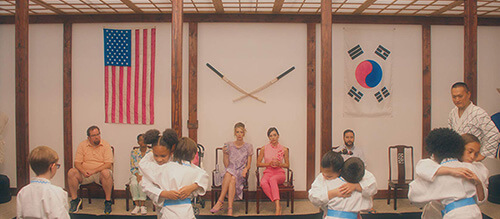Greener Grass (2019) Review
Greener Grass (2019)
Director: Jocelyn DeBoer and Dawn Luebbe
Screenwriters: Jocelyn DeBoer and Dawn Luebbe
Starring: Jocelyn DeBoer, Dawn Luebbe, Beck Bennett, Neil Casey
Greener Grass is a masterwork in surreal comedy from all perspectives of filmmaking that keeps its logic consistent and manages to take itself completely seriously. In the opening moments, Lisa (Luebbe) asks Jill (DeBoer) if she can have her baby, Madison. Jill agrees and hands the baby over; she’s Lisa’s child now. This sets the tone for the onslaught of absurdity that kept the crowd at Oak Cliff Film Festival laughing until the end.
Greener Grass is best described as a series of consecutive sketches, following the descent of Jill from a social alpha to pariah. The inhabitants of this world (mostly) live in an affluent neighborhood. Characters partake in activities like parties, sporting events, candlelight vigils, music recitals or watching TV, which can result in life-changing consequences. These consequences persist throughout the film, and are seamlessly woven into the world’s fabric. One of the film’s most interesting dynamics is that women are the heads of the families, and they typically possess stronger wills than the happy go-lucky, goofy men.
DeBoer and Luebbe work incredibly well with collaborators, and this shines through on screen. During the Q&A following the screening, DeBoer told a story about Julian Hilliard falling in a scene in a particular way, and when asked why, he replied that’s how Julian (the character) falls. It stayed in the film. Costume Designer Lauren Oppelt told The Film Magazine that it was her creative decision to color code family wardrobes based on the mother, and they developed a system where men wear blue, women wear pink, and kids incorporate their mother’s color with the corresponding gender color. Cinematographer Lowell A. Meyer told The Film Magazine that he experienced similar creative freedom. “Luebbe and DeBoer were constant joys to be around… They gave me everything I need to bring their vision to life, and let me do so with a broad range of tools and full autonomy over my craft.” One of his many contributions was a transition from softer focus to a sharper, crisper style at the end, representing Jill and the audience’s change in perception of this world. As her life gets worse and worse, she begins to see the subtle horrors of her reality more clearly. The greatness of Production Designer Leigh Poindexter was also extolled by Oppelt, evidenced to the viewer through sets filled with subtle jokes and easter eggs that make a rewatch vital for any fan.
The performances in Greener Grass are also excellent across the board; an element of any comedy that is central to its success. Luebbe and DeBoer play their characters with necessary ham; their characters are themselves acting in a sense, presenting a veneer of happiness and success to the world. Beck Bennett is no stranger to absurdism (check out Good Neighbor Stuff), and he has a knack for playing it with a straight face. The performances speak to the strength of the directors, who started out writing and acting in sketch groups before getting into directing; an aspect of their development that has come to the fore in a tremendous fashion through this film.
Greener Grass is a bold comedy that is also incredibly detailed. The level of effort that went into even the smallest aspects of this film makes for a work that is at least worth appreciating as art even if the humor isn’t to your preference. Making their debuts with this feature, DeBoer and Luebbe are filmmakers that are worth looking out for, their work here illustrating a real talent and class, and whatever they do next being of great interest to any who see this film.
22/24
[DISPLAY_ULTIMATE_SOCIAL_ICONS]


